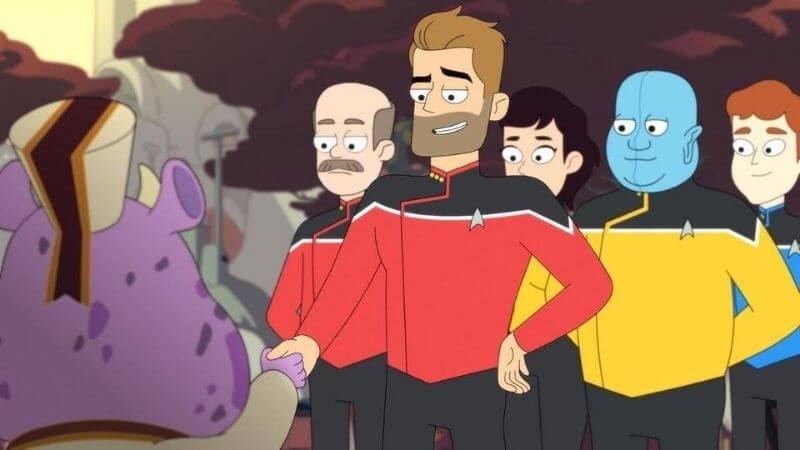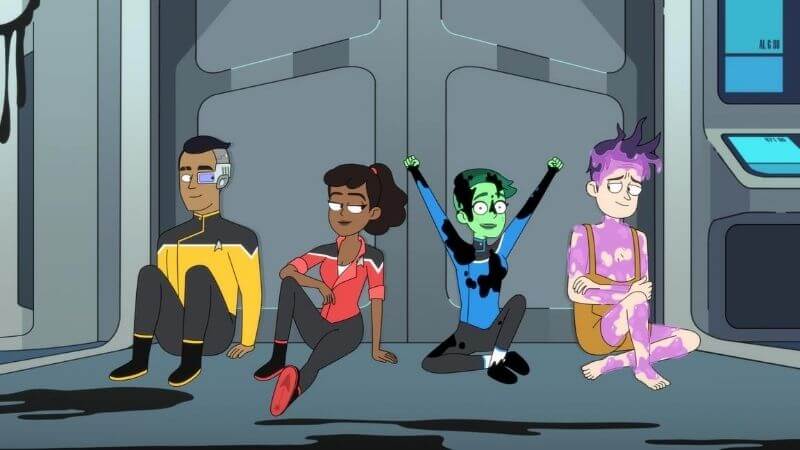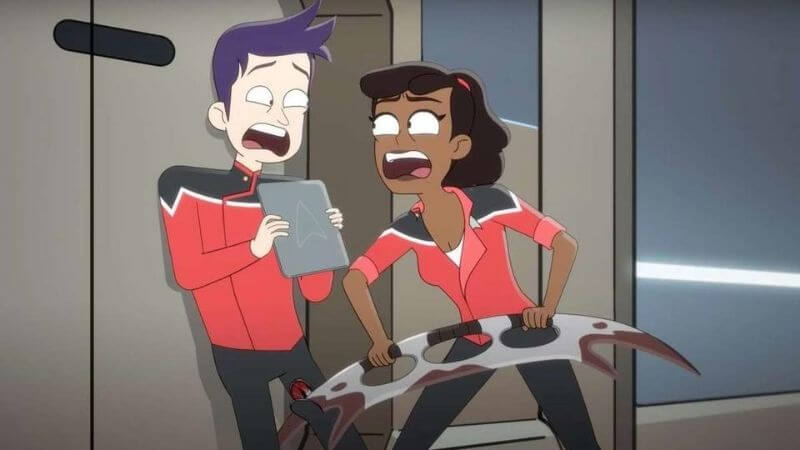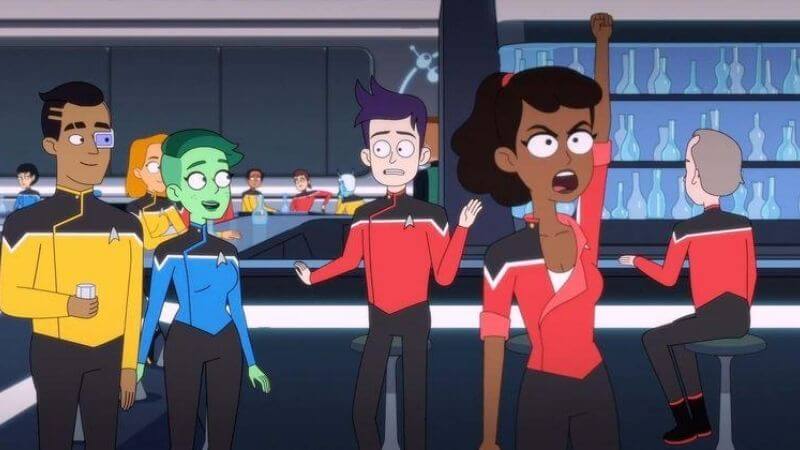Title: Star Trek: Lower Decks Episode 1 – ‘Second Contact’ Review
Release Date: August 6, 2020
Network: CBS All Access
Genre: Science Fiction
Trust a Trekkie, Lower Decks’ first episode was really exciting. And no, not because it was some grand, perfect episode or changed the face of Star Trek. It’s not even because (for Trek) it was a pretty good first outing considering Trek’s first season curse (almost all first seasons are dicey at best).
No, Lower Decks is exciting because of its fantastic potential.
Hear me out.
Lower Decks Episode 1: “Second Contact”
But let’s start with a summary. The episode begins with a captain’s log, but (very fittingly) it’s not a real one. Actually, it’s the hopeful Ensign Boimler pretending. His co-worker, Beckett Mariner, catches him and goes on a drunken tirade mocking him… until she slices his leg with a bat’leth.
Mind you, that’s just the first few minutes.
After that, fans are introduced to the other main cast members, like the excitable Ensign Tendi from Orion and the newly cybernetic Ensign Rutherford. This also includes the senior staff, like Captain Freeman, Commander Ransom, and Doctor T’Ana. Then, they go on a par-for-the coarse Trek adventure. They are checking in with a race, the Galardonians, for Second Contact. Commander Ransom gets infected with (basically) a zombie virus while Mariner and Boimler end up on a side-quest for farming supplies that teach him more about who she really is.
Oh, and it’s revealed that Mariner isn’t just any troublemaker Ensign; she’s Captain Freeman’s daughter.
From an objective standpoint, the episode was pretty average, mid-tier fair. It was moderately funny, it didn’t push any boundaries, and the conflicts weren’t the most compelling.
But there’s a lot of things to be excited about, too.
Rick and Morty and Lower Decks
For one, the Rick and Morty inspiration of it all definitely isn’t relying on the same nihilism. Instead, they’ve weaved in that good old Star Trek optimism. They’ve also already shown they can use the absurdism of the chaos on a Starfleet starship to Lower Decks’ advantage. The best example of this is Rutherford’s date, where in the middle of a zombie outbreak, he and the Trill officer are still flirting and getting to know one another. Guess chaos is that normal on a Starfleet vessel, eh?
Also, while Boimler and Mariner are pretty typical, Rutherford and Tendi are unique and fascinating main characters on their own. Rutherford’s Vulcan cybernetics make him a complicated character, watching him fight for his own emotions against the tech that keeps him alive. And Tendi is just so eager and adorable, in an almost a terrifying way. Also, any Trek fan would be psyched about an Orion woman who finally gets to be more than just eye candy.
On the flips side, it can feel like it has a bit of lost identity syndrome. Not that it doesn’t show a clear love and reverence for Star Trek, but it more feels like a Star Trek themed Rick and Morty episode at times than Star Trek; like Rick and Morty might just hop out of their own holodeck at the end. It absolutely leans a little too heavy on its creator’s Rick and Morty roots. There’s an-alcohol loving loose cannon, a nervous, young good guy, and a lot of… goo. Fans of both Star Trek and Rick and Morty can also see the clear art design inspiration, which can feel a little too obvious.
The series will have to work on carving out its own identity a little better as things go on. While the potential of the show gives the writers a great shot of moving past this, they do have to actually use it to become something of their own.
The Star Trek References
Before we get to our conclusion, we can’t talk about Lower Decks without talking about the references. Boy, are they plentiful. The Star Trek theme, Captain Freeman’s office filled with memorabilia from other famous captains, the cetacean deck, Klingons with eyepatches, and so much more. Between the Rick and Morty influence and the referential nature of Star Trek series, of course Lower Decks is chock-full of them.
But I do think that the series is pretty good about using a lot of them as passing information. That’s better than writers using references to manipulate fan nostalgia. That can seem like a bold statement, considering, y’know, it’s Star Trek, and the first episode seeming a little heavy-handed is inevitable. But it’s inviting new and old fans to this fresh USS Cerritos situation. Of course things get explained a little bit more intensely. Considering the fact they kept the Spock or Picard factor to a minimum, they did a decent job.
Other than basic ship explanations, the referential game was just on par with most other animated adult series.
Lower Decks‘ Potential
The most important part of the episode, though, is that potential I mentioned. Where, you might ask?
Well thanks for asking, because I have an answer.
The potential of the show relies on some of the strengths of the other franchises. The moments of human connection, friendship, and bonding can be some of the funniest and most compelling parts of Trek episodes. Think Data and Geordi in the holodeck, Sisko and his son talking baseball, Spock playing chess with Michael.
Mariner’s complex relationship with her captain mother and Tendi and Rutherford’s geek chats are so reminiscent of those shining Trek moments; the kind where the writers use the science fiction setting to frame these beautiful, funny moments that connect people.
Lower Decks needs to build those relationships with its whacky Star Trek space adventures. That will build a foundation for the show to make it compelling and fun. There’s a reason the season one Trek curse exists; In such a vast universe, every series struggles to define its characters early on. It’ll take time to know what kind of stories will make these characters shine. After all, Worf, one of the most beloved characters in Star Trek, was little more than a walking growl machine his first season.
So while I don’t wish the first season curse on Lower Decks, the fact its first episode wasn’t a big mess and is focusing on its characters bodes well for the future of its stories.
Oh, and for an animated story with so much room for variety, it kinda sucks there’s only one alien in the main Ensign squad.
Regardless, I can’t see what happens next (even if I never really want to hear the word suckle ever again).
Verdict: Star Trek: Lower Decks doesn’t feel like much on its first outing. It leans too hard on its creator’s background in Rick and Morty. However, the way it balances respecting its gargantuan franchise and poking fun at it, the series has real potential. There are also some great concepts in there that could grow into something fantastic (like Rutherford’s implant, Mariner’s family relationships, and Tendi’s almost frightening enthusiasm). So far, all we have is hope with mediocre substance. There’s a lot of potential for the show, but only time will tell if it pays off.
[review]










